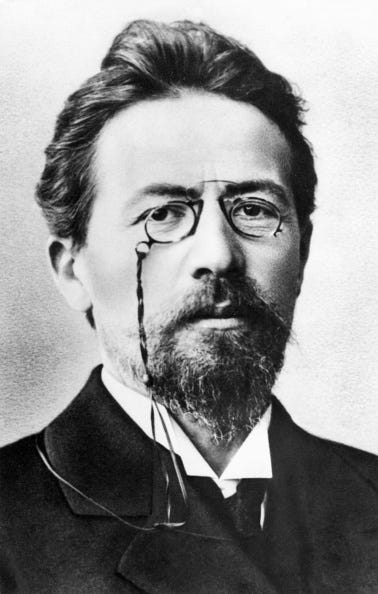The Writer's Almanac from Monday, January 29, 2007
"The Virtue of Trusting One's Mind" by Marcia Slatkin, from A Woman Milking: Barnyard Poems. © Word Press.
It's the birthday of writer and politician Thomas Paine, born in Thetford, England (1737). With his anonymously published pamphlet "Common Sense," in 1776, he helped start the American Revolution, even though he'd only been living in America for a little more than a year.
Thomas Paine said, "He that would make his own liberty secure, must guard even his enemy from oppression; for if he violates this duty, he establishes a precedent that will reach to himself."
It's the birthday of writer Anton Chekhov, born in Taganrog, Russia (1860). His father came from a long line of serfs, but his grandfather had bought the family's freedom before he was born. When Chekhov was 16, his father's grocery store went out of business. The whole family left for Moscow, except Anton, who was left behind to finish school and earn money. He lived in the corner of a house and scraped out a living by tutoring family friends. He later called his adolescence a "never-ending toothache."
After he graduated from high school, he left for Moscow to study medicine. He only started writing as a way to make some extra money that he could send to his family. By the time he was in his 20s, he was the primary financial support for his entire family, so he just wrote as quickly as he could what he thought the newspapers wanted. He also wrote comic calendars, questionnaires, theater reviews, and other journalism on top of his considerable medical responsibilities.
In 1884, Chekhov finally got his medical degree and began his career as a doctor. He set up free clinics in provincial Russia, and often treated peasants whose poverty reminded him of his childhood. He wouldn't ask for very much money in return for his care.
He was still writing short sketches for newspapers in his spare time when, in 1885, he took a trip to St. Petersburg and suddenly realized that members of the literary society there had been reading his stories for months, and they considered him an important new writer. He wrote to his brother, "Formerly, when I didn't know that they read my tales and passed judgment on them, I wrote serenely, just the way I eat pancakes; now, I'm afraid when I write." But though it scared him to think that he had a real audience, it was only then that Chekhov decided to start writing seriously.
He went on to help invent the modern short story. He managed to produce more than 600 stories in his lifetime, and he was one of the first writers to use short stories to explore characters, rather than events. And he was also one of the first not to use surprise endings. Chekhov often wrote about people with glaring moral flaws, like prostitutes and criminals, but he didn't condemn their actions. He said, "The artist should not be the judge of his characters and what they talk about, but only an impartial witness. ... A writer should be as objective as a chemist."
After five years of relative literary success, Chekhov decided to get away from the big city, and he set out on a trip to visit an island penal colony in Siberia to provide medical service and help advocate for prison reform. Over the course of a few months, he managed to interview all 10,000 of the prisoners, and when he got home he wrote a nonfiction book about the experience that was the longest book he ever published in his lifetime. But the trip ruined his health and exacerbated his tuberculosis. He moved to Yalta, hoping that living on the coast would improve his condition, and it was there that he wrote some of his most famous short stories, including "The Lady with the Dog."
Anton Chekhov said, "Any idiot can face a crisis; it is this day-to-day living that wears you out."
It's the birthday of comedian and actor W.C. Fields, (sometimes listed as April 9, 1879) born William Claude Dukenfield, in Philadelphia, Pennsylvania (1880). He wrote the screenplays for some of his best-known films, including The Bank Dick (1940), Never Give a Sucker an Even Break (1941), and You Can't Cheat an Honest Man (1939).
He said, "It ain't what they call you, it's what you answer to." And he said, "There comes a time in the affairs of man when he must take the bull by the tail and face the situation."
It's the birthday of novelist, short-story writer, and poet Virgil Suarez, born in Havana, Cuba (1962). He's the author of more than 15 books, including his first novel, Latin Jazz (1989), and the poetry collection Landscapes and Dreams (2003).
It's the birthday of novelist and essayist Edward Abbey, born in Indiana, Pennsylvania (1927). When he was 17 years old, he saw the desert for the first time as he hitchhiked and rode the rails across the country. He returned to the East to work for a short time as a caseworker in a welfare office, but then he went back to the Southwest to work as a fire lookout and ranger in Arches National Park. He worked there for three years, and turned the experience into the book Desert Solitaire (1968).
Be well, do good work, and keep in touch.®
CLICK HERE for details about our 50th Anniversary Tour!






“Siberia” is Not the best description of where Checkov went. He went and lived for months to Sakhalin Island, Russian Far East,an long 600 km Island 30 km North of Hokkaido Island Japan. He returned via Indian Ocean and was quoted as saying” I’ve seen Heaven ( Ceylon), and I’ve seen Hell ( Sakhalin). I spent 2 years there 2001-3.
Greetings Mr. GK:
This might be a silly question, but have you read all the authors you tell us about in your Almanacs?